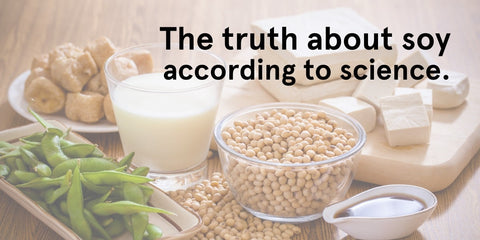Why Soy Protein?
At Soylent, we live and breathe for soy. Soy Protein Isolate is the core of our meal replacement shakes and soy protein powder for many reasons. And, we love it for more than its silky smooth texture.
We want you to be as big of a fan of soy as we are. So, we’re going to do a deep dive into soy so you can understand why we chose it as the best base for you to get a great tasting alternative.
What is soy?
Soy is an excellent source of high-quality protein.
Soybean is a legume, it is a staple food in many countries as an excellent source of high-quality protein. It's not called Glycine MAX for nothing. Compared to other legumes (pea, peanut, lentils), soybean has the most complete amino acid profile and makes it a complete protein source.
At Soylent, we harness the power of soy protein isolate. So, what’s that? Soy protein isolate is purified from whole soybeans. Soy isolate has 90-95% protein, while other high protein foods vary widely in their protein quality and content.
Meat, eggs, and nuts are great sources of protein, but the amount of protein in them can vary. Whole food, animal and seed protein sources often come with unhealthy levels and types of fat, such as saturated fat and cholesterol.
Many plant proteins, such as those from beans, peas or rice may not have all the essential amino acids you need. Plant proteins can also contain anti-nutritional components that inhibit digestion, like phytates. So, it is important to be mindful of your protein sources.
It’s important to get a diversity of high-quality protein sources.
Plant-based proteins, especially soy protein, are essential in order to get high-quality lean protein, without a lot of bad fat. Keeping variety in your protein consumption, and including soy protein, ensures you’re getting enough of what you need while limiting the stuff you should avoid.
Why we chose soy.
There are a lot of reasons to choose soy as our protein source.
Soy is a complete source of protein and is the closest in protein quality to cow's milk. This means that it contains all of the essential amino acids that are necessary for healthy, growing, and functioning bodies.
Soybeans have been grown and harvested for thousands of years and it has been a staple in many diets for just as long. We chose soy for this reason. It has been proven time and time again that diets high in soy protein and low in animal protein have lower risks of developing health complications and a better chance of living longer healthier lives.
Soy protein isolate also has a great bioavailability, which is why we chose it as the base for all of our meal replacement shakes and drinks. Bioavailability is the level at which it is absorbed by our digestive system. The soy isolate used in Soylent has a Protein Digestibility Corrected Amino Acid Score (PDCAAS) of 1, matching that of milk protein.
In addition to being the only plant-based protein that scored this well, we also chose soy isolate because it has a smooth texture and taste. It creates the optimal flavor profile and health benefits.
To further our investigation of the best source of protein, we tested it against many others of its kind. Here’s what we found:
Whey, casein, and egg whites.
All three of these have an equal bioavailability score to soy protein isolate but have other drawbacks. These options are derived from animal products, so they typically use more resources to be produced than plant-based proteins.
Hemp.
Hemp has a PDCAAS score of 0.46, meaning it is less bioavailable than soy. It also typically has a gritty texture, as well as an earthy and green taste.
Peas.
Similar to hemp protein, pea protein typically has a lower PDCAAS score of 0.69-0.89. It also has a strong earthy flavor and a thicker, less smooth texture.
Rice.
Rice typically has a PDCAAS score of 0.47 and has a rough, silty, occasionally sandy feel due to the brown rice protein. Another major downside is the amount of heavy metals rice naturally picks up from the ground (e.g. arsenic), which can be a concern for meal replacements.
It’s important to remember that soy is not entirely hypoallergenic. There is a small percentage of the population that is allergic to soy. Always check with your doctor to make sure you are not allergic to this form of protein.
Benefits of eating soy
Adding more soy into your life is beneficial for many reasons. It’s a great form of protein that can add true value to your diet.
Better for your health over time
According to the American Heart Association, too much cholesterol can pose a problem to your overall health. Cholesterol comes from two sources—your natural liver function and foods derived from animals. Meat, poultry, and full-fat dairy products all contain cholesterol, and typically, those same foods are high in saturated and trans fats.
Keeping a balanced diet of meat and soy protein can help you control cholesterol levels long-term.
Sustainability.
Swapping protein intake from meat to soy can help save precious sources from the environment. Let’s put this into perspective:
To produce one pound of beef, 1,799 gallons of water is used.
To produce one pound of pork, 576 gallons of water is used. One pound of beef or pork is just enough to feed a family of four for one meal.
But, to produce one pound of soybeans, it only takes around 216 gallons of water.
Effects of soy.
Just like most foods, there can be a few effects that soy has on the body. Here are few you should note.
Allergies.
There are tons of foods out there that cause allergic reactions. Soy is one of them. It’s actually one of the top eight most common food allergens in the US. This, unfortunately, will eliminate soy and Soylent from some people out there. There are some alternatives out there, like whey, casein, and eggs, which are also on the list of top allergens.
Always consult with your doctor before consuming anything out of the ordinary.
Hormonal Effects.
There is a scary myth that consuming too much soy can give men a little more in the chest region. The reason this myth came about is because of the presence of isoflavones. This is one of the key components of soy. It is a plant-based molecule that has an estrogen-like activity which has caused a fear that eating too much soy can cause the development of breast tissue.
The main issue with these claims is that nutritional research, including both clinical trials and meta-studies, are inconclusive at best. There are studies showing protective and antagonistic results for both breast cancer and prostate cancer, some show lowered testosterone and sperm counts in men, while others show no change, and the list goes on and on.
The takeaway for us is this: so far soy seems safe, especially when compared to other protein sources whose consumption is much more closely linked to cancer.
How you can add more soy into your life.
As you know by now, choosing to add soy into your life can greatly benefit your diet.
Unlike some plant proteins, soy protein is considered a complete protein, containing all nine essential amino acids that the body cannot make which must be obtained from the diet. By swapping one meal a day with one filled with soy protein, like Soylent, you can make a positive difference in your diet and in the environment. One of the easiest ways that you can start incorporating meal replacement drinks into your life is through breakfast. When you wake up, you’re frequently on a time crunch. Get all the nutrients you need without any prep. You’ll skip the fatty bacon biscuit and get a better jump start to your day.






